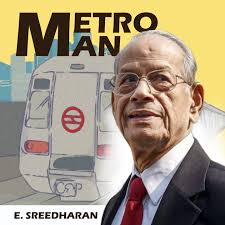E. Sreedharan: The Metro Man Who Revolutionized Urban Transport in India
Elattuvalapil Sreedharan, widely known as the "Metro Man," is a celebrated Indian civil engineer and retired bureaucrat credited with transforming India's urban transportation landscape. His exceptional leadership, integrity, and focus on efficiency and punctuality redefined the execution of public infrastructure projects in India, setting new benchmarks for the entire country.
Early life and careerBorn on June 12, 1932, in Palakkad, Kerala, Sreedharan began his career in the Indian Engineering Service (IES) after completing his civil engineering degree.
In his early career, he gained recognition for completing the repair of the cyclone-damaged Pamban Bridge in Tamil Nadu in just 46 days, far ahead of the six-month deadline.
He later oversaw the planning and design of India's first-ever metro system, the Kolkata Metro, in the 1970s.
The Konkan Railway
In 1990, after retiring from the Indian Railways, Sreedharan was brought back to serve as the Chairman and Managing Director of the Konkan Railway Corporation. Project scope: The project involved building a 760-kilometer railway line along India's western coast through incredibly challenging and difficult terrain, which included numerous tunnels and bridges.
Unique approach: Sreedharan completed the project in a record seven years, using a novel Build-Operate-Transfer (BOT) model. This achievement demonstrated that large-scale public projects could be delivered on time and within budget.
The Delhi Metro
Sreedharan's most prominent role was as the Managing Director of the Delhi Metro Rail Corporation (DMRC), a position he held from 1995 to 2011. Revolutionary impact: Under his leadership, the Delhi Metro became a world-class urban transport system, completed ahead of schedule and within budget.
Model of efficiency: The success of the Delhi Metro provided a blueprint for metro systems across India, inspiring similar projects in cities like Kochi, Lucknow, and Jaipur.
Key principles: Sreedharan's success was attributed to his principles of professional competence, strict project planning, isolation of projects from political pressures, and zero tolerance for corruption.
Later contributions and legacy
Even after retiring from the DMRC, Sreedharan continued to serve as a principal advisor for metro projects in Kochi and Lucknow.
His legacy is defined by more than just successful projects. His work has fundamentally changed the public's expectations of infrastructure delivery by proving that:Infrastructure can be a catalyst for social change, not just a technical achievement.
Ethical leadership and integrity are powerful drivers of progress.
Large-scale projects can be completed efficiently through a culture of discipline, accountability, and innovative thinking.
Awards and recognition
For his exceptional contributions to India's infrastructure, E. Sreedharan has received numerous prestigious honors, including:
Padma Shri (2001)
Padma Vibhushan (2008)
Chevalier de la Légion d'honneur, France's highest civilian honor (2005)
Named one of Asia's Heroes by TIME magazine in 2003
Indian Scientist Awards 2025!
Visit: https://
Nominate Now: https://indianscientist.
Registration page : https://indianscientist.in/
Contact us : indian@indianscientist.in



.jpg)
Comments
Post a Comment